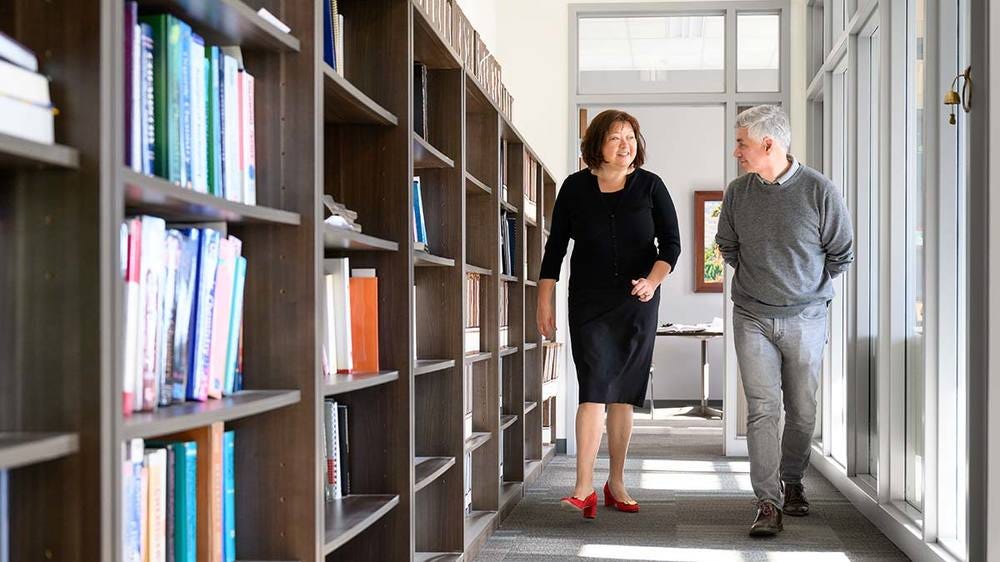$5M Grant Boosts Drug to Prevent Diabetes-Related Amputations
 Chang (left) is personally connected to her work; she has diabetes
Chang (left) is personally connected to her work; she has diabetes
Subscriber Benefit
As a subscriber you can listen to articles at work, in the car, or while you work out. Subscribe NowPatients who have undergone a diabetes-related amputation currently face a terrifying prognosis: only 50 percent survive one year after losing the limb, says University of Notre Dame Chemistry and Biochemistry research professor Dr. Mayland Chang. A team of scientists at the university believes it has uncovered a drug that will save the limbs and lives of people with diabetes. They recently secured the project’s largest dose of funding yet—a $4.6 million grant—to move a drug forward that attacks the root cause of these amputations: diabetic foot ulcers.
The nearly $5 million dose of funding is coming from the Department of Defense, as the prevalence of diabetes among veterans is even higher than the disease’s heavy burden on U.S. adults. The National Institutes of Health (NIH) says 27 percent of veterans 65 and older have diabetes.
Diabetic foot ulcers are a common problem for people with the disease—one in four patients will develop the wounds. They can creep up on people with diabetes unnoticed; high glucose levels lead to neuropathy, which can cause numbness in the feet. Consequently, minor wounds left undetected can quickly become insidious and develop into a diabetic foot ulcer, which often triggers a dangerous domino effect.
Diabetic foot ulcers can have tragic outcomes; they are notoriously difficult to heal and often result in lower-limb amputations—about 100,000 per year in the U.S. Chang says only about half of these amputees survive one year after losing the limb, as the surgical site becomes a larger wound that is even more difficult for their bodies to heal.
Through extensive research, Chang and Notre Dame Navari Family Professor in Life Sciences Dr. Shahriar Mobashery have decoded the science of wounds. A normal wound goes through a cycle of inflammation, then forms new blood vessels and the tissue is repaired. However, for people with diabetes, wounds get “stuck” in the inflammation stage and don’t heal.
“The current line of thinking is to throw growth factors at it to promote blood vessel formation, hoping to push that cycle into healing,” says Chang. “But that doesn’t treat the root cause of why these wounds are stuck at the inflammation stage. We have done research and found that these wounds don’t heal, because there’s an enzyme called MMP-9 that prevents these wounds from healing.”
The duo also uncovered a second enzyme, MMP-8, that promotes healing. That knowledge opened the door to a new line of attack: they created a drug—used as a topical gel—that blocks the detrimental MMP-9 enzyme, while allowing MMP-8 to carry out its beneficial role.
“You don’t want to stop the body’s natural ability to heal, so [our drug] allows the body to heal that wound,” says Chang. “We hope this will really help patients suffering from diabetic foot ulcers.”
The team has also created a startup called SalvePeds, which means “saving feet” in Latin. The South Bend-based startup captured the top prize last year at BioCrossroads’ New Venture Competition. Chang says the recent Department of Defense funding means “this drug will see the light”; she expects to begin human clinical trials in two years.
“This funding takes discoveries from the lab and moves it to humans; to be able to do the toxicology [studies] to take it to Phase 1 clinical trials—it’s very difficult to find the funding,” says Chang. “We now have the most important thing, which is the funding to enable that.”
Chang is personally connected to her work; she was recently diagnosed with diabetes, her mother passed away from complications of the disease, her aunt died prematurely from diabetes and her sister has diabetes. Chang believes the drug is far superior to the current treatment, which was approved 20 years ago and only reduces MMP-9, but doesn’t shut it down; it’s also scarcely used, because it carries a risk of cancer and death.
“We’re confident we’ll see better efficacy in human clinical trials, so we’re really excited about that,” says Chang. “This could really make a difference in patient’s lives and save their limbs.”
Chang says the only other drug on the market to treat diabetic foot ulcers carries heavy risks and is less effective than the drug her team is developing.
Chang says the team analyzed diabetic foot ulcer tissue samples from patients in Elkhart and discovered the more severe wounds will likely benefit the most from the new drug.
